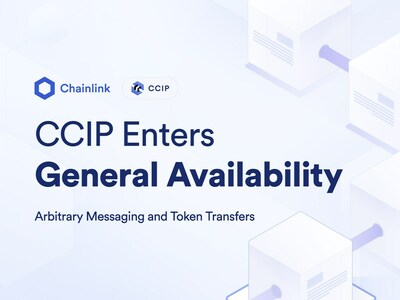
All developers can now integrate CCIP across 9 blockchain mainnets in a faster, easier, and more self-serve manner than ever before.
SAN FRANCISCO, April 24, 2024 /PRNewswire/ — Chainlink, the industry-standard decentralized computing platform, announced today that the Chainlink Cross-Chain Interoperability Protocol (CCIP) has officially entered General Availability (GA). Any developer can now permissionlessly use CCIP to securely transfer onboarded tokens cross-chain, send arbitrary messages to smart contracts on another blockchain, or simultaneously send data and value together through CCIP’s unique support for Programmable Token Transfers. Supported blockchains include Arbitrum, Avalanche, Base, BNB Chain, Ethereum, Kroma, Optimism, Polygon, and WEMIX, with many more to come in the future.
CCIP’s arbitrary messaging capabilities enable developers to create cross-chain smart contracts that can send data to and trigger function calls on smart contracts deployed on other blockchains while CCIP’s token transfers enable both users and smart contracts to transfer tokens cross-chain such as ETH, USDC, LINK, and more. Additional blockchains and tokens will continue to be onboarded.
“CCIP is now starting to become the standard for both capital markets blockchain transactions across banks, as well as the way that secure Web3 cross-chain value and data is moved across public chains,” said Sergey Nazarov, co-founder of Chainlink. “The mainnet general availability of CCIP is something that makes it even easier for developers to quickly adopt CCIP as a secure mechanism for cross-chain connectivity.”
CCIP GA is taking place at a key moment in time, made possible by the introduction of several new in-demand features, including Transporter—a hyper-secure bridging application, the addition of token transfer support for USDC—one of the most widely used stablecoins in DeFi, support for Native ETH token transfers, an updated CCIP pricing model, and CCIP achieving 900%+ growth in the number of cross-chain transactions and a 4,000%+ growth in cross-chain transfer volume processed by CCIP during Early Access in Q1 2024 compared to Q4 2023. This included multiple transactions of nearly $1M USDC, showcasing CCIP’s ability to secure large amounts of value over an extended period of time.
Notable CCIP users include Aave, Metis, and WEMADE. Aave is the largest DeFi lending market by TVL, which announced an integration of CCIP to enable cross-chain transfers of the decentralized stablecoin GHO. Metis selected CCIP as its canonical token bridge for new tokens, and WEMADE, one of South Korea’s largest game developers, integrated CCIP on WEMIX3.0 mainnet as its exclusive cross-chain infrastructure.
CCIP also solves the obvious need for tokenized assets to seamlessly move across public and private blockchains, which is critical to connecting buyers and sellers from different blockchain ecosystems. CCIP is also part of the broader Chainlink platform that features additional critical data and computation resources needed to create secure and liquid tokenized real-world asset (RWA) markets. Chainlink is the only platform that provides data, compute, and blockchain interoperability as part of a single offering for tokenized assets.
To learn how CCIP helps the industry overcome the historical exploits that have plagued the cross-chain ecosystem, watch Chainlink Co-Founder Sergey Nazarov explain how CCIP is the only interoperability protocol with level-5 cross-chain security. You can also read the blog The Five Levels of Cross-Chain Security for a deeper dive.
About Chainlink
Chainlink is the industry-standard decentralized computing platform powering the verifiable web. Chainlink has enabled over $10 trillion in transaction value by providing financial institutions, startups, and developers worldwide with access to real-world data, offchain computation, and secure cross-chain interoperability across any blockchain. Chainlink powers verifiable applications and high-integrity markets for banking, DeFi, global trade, gaming, and other major sectors.
Learn more about Chainlink by visiting chain.link or reading the developer documentation at docs.chain.link.
SOURCE Chainlink